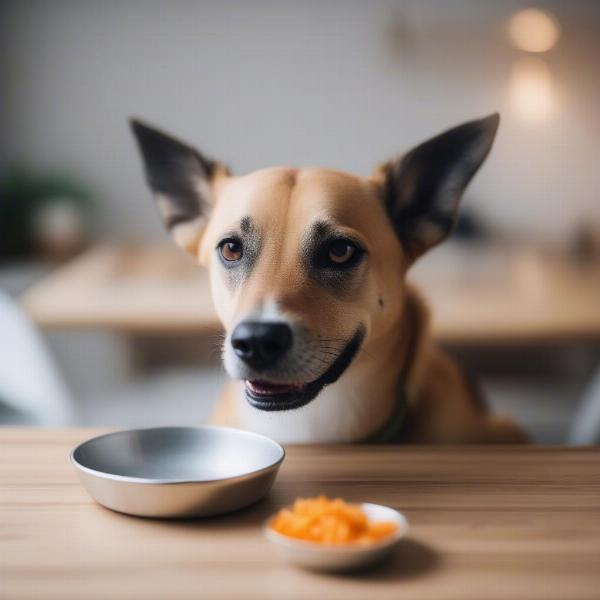Choosing the right dog food for a dog experiencing seizures can feel overwhelming. Understanding the connection between diet and seizures, and knowing what to look for in dog food, can significantly impact your dog’s well-being. This article will guide you through selecting the best dog food for dogs with seizures, offering practical advice and expert insights to help manage this challenging condition.
Understanding the Diet-Seizure Connection
While diet alone may not cure seizures, it plays a crucial role in managing them. Certain nutritional deficiencies can exacerbate seizure activity. A balanced, easily digestible diet can improve overall health, potentially reducing seizure frequency and severity.
Key Nutrients for Seizure Management
When selecting dog food for a dog with seizures, prioritize these key nutrients:
- Medium-Chain Triglycerides (MCTs): MCTs are a readily available energy source for the brain that can help stabilize blood sugar levels, a factor that can influence seizure activity.
- Antioxidants: Antioxidants like Vitamin E and C, and selenium, can protect brain cells from damage caused by oxidative stress, which is often linked to seizures.
- B Vitamins: B vitamins are essential for nerve function and can help support overall brain health.
- Omega-3 Fatty Acids: Omega-3s have anti-inflammatory properties that may be beneficial in reducing seizure frequency.
Choosing the Right Dog Food
Look for dog food that is:
- Highly Digestible: Easy digestion ensures optimal nutrient absorption, crucial for supporting brain health.
- Grain-Free or Limited Ingredient: These diets can help minimize potential allergens that might trigger seizures in some dogs.
- Rich in MCTs: Consider adding MCT oil to your dog’s food as an additional source of these beneficial fats.
 Dog eating food from a bowl
Dog eating food from a bowl
Commercial vs. Homemade Diets
Both commercial and homemade diets can be suitable for dogs with seizures. Commercial diets offer convenience and are formulated to meet specific nutritional needs. However, homemade diets offer greater control over ingredients. If choosing a homemade diet, consult with a veterinary nutritionist to ensure it’s balanced and provides all necessary nutrients.
What to Avoid in Dog Food
Certain ingredients can be detrimental to dogs with seizures. Avoid dog food containing:
- Artificial Colors and Flavors: These additives can be neurotoxins and may exacerbate seizure activity.
- Excessive Sugar: High sugar content can lead to fluctuations in blood sugar, potentially triggering seizures.
- Known Allergens: If your dog has known food allergies, avoid those ingredients.
Working with Your Veterinarian
It’s crucial to work closely with your veterinarian when choosing dog food for a dog with seizures. They can recommend specific diets based on your dog’s individual needs and health status. They can also help monitor your dog’s response to the new diet and make adjustments as needed.
Conclusion
Choosing the right dog food is a vital step in managing seizures in dogs. By focusing on a balanced, easily digestible diet rich in key nutrients like MCTs, antioxidants, and omega-3 fatty acids, you can support your dog’s overall health and potentially reduce the frequency and severity of their seizures. Remember to consult with your veterinarian for personalized recommendations and ongoing monitoring.
FAQ
- Can diet alone cure seizures in dogs? No, diet alone is unlikely to cure seizures, but it can be a crucial part of an overall management plan.
- What are the best sources of MCTs for dogs? Coconut oil and MCT oil are excellent sources of MCTs.
- How long does it take to see improvements after changing a dog’s diet? It can take several weeks or even months to see noticeable changes in seizure frequency after a dietary change.
- Is a grain-free diet always the best choice for dogs with seizures? Not necessarily. While some dogs benefit from grain-free diets, others may not. Consult your veterinarian for guidance.
- Are there any specific dog food brands recommended for dogs with seizures? Your veterinarian can recommend specific brands based on your dog’s individual needs.
- Can seizures in dogs be completely controlled with diet and medication? While complete control may not always be possible, a combination of diet and medication can significantly improve seizure management in many dogs.
- What should I do if my dog has a seizure while eating? Remove any food or objects that could cause injury and contact your veterinarian immediately.
Related Articles on ILM Dog
why does my dog keep opening and closing his mouth
tiki dog wet food
detox for dogs
service dog etiquette
ILM Dog is your trusted resource for expert advice on dog breeds, health, training, nutrition, grooming, and much more. We’re committed to providing dog owners worldwide with practical, reliable information to help them care for their canine companions. Our expertise covers all aspects of dog care, from selecting the right breed to ensuring optimal health and nutrition. Contact us today for personalized advice! Email: [email protected] Phone: +44 20-3965-8624. Visit ILM Dog for more information.